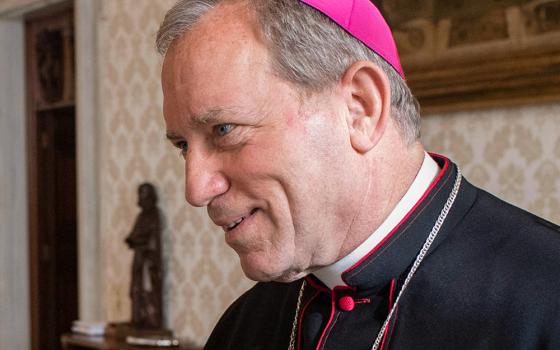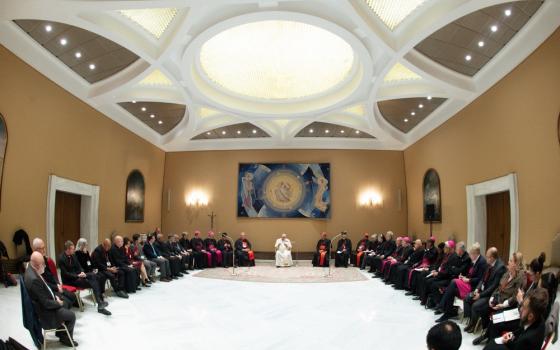While most members of the U.S. media spent this week perseverating on what the synod's midterm progress report actually means for cohabitating, civilly married or same-sex couples, few apparently noticed that the synodal fathers also had something to say about contraception.
Since few commentators seemed to think that paragraphs 53 and 54 of the report were worth mentioning, those sections bear repeating here:
53. It is not difficult to notice the spread of a mentality that reduces the generation of life to a variable of an individual's or a couple's plans. Economic factors sometimes have enough weight to contribute to the sharp drop in the birthrate which weakens the social fabric, compromising the relationship between generations and rendering the view of the future less certain. Being open to life is an intrinsic requirement of married love.
54. Probably here as well what is required is a realistic language that is able to start from listening to people and acknowledging the beauty and truth of an unconditional opening to life as that which human life requires to be lived to its fullest. It is on this base that we can rest an appropriate teaching regarding natural methods, which allow the living in a harmonious and aware way of the communication between spouses, in all its dimensions, along with generative responsibility. In this light, we should go back to the message of the Encyclical Humanae Vitae of Paul VI, which underlines the need to respect the dignity of the person in the moral evaluation of the methods of birth control.
That these paragraphs did not garner greater attention in United States is tragic, especially among Catholics invested in social justice issues and the plight of the poor.
The synodal fathers claim to be concerned about a declining birth rate. While it is true that there is a decline in countries like Germany, Japan, Brazil and Russia, in sub-Saharan Africa, the population is soaring. In Niger, Mali, Somalia, Uganda, and Burkina Faso, the average number of births per woman is six or higher.
In addition to a massive population growth, sub-Saharan Africa also accounts for almost 70 percent of the global total of new HIV infections, according to the United Nations' 2013 statistics. Last year, 1.1 million people died of AIDS in that region, and a devastating 24.7 million are currently suffering with HIV or AIDS.
Last week, NCR reported that Nigerian Archbishop Ignatius Kaigama, in a four-minute statement, insisted that Africans have "come of age" and believe that contraception is wrong, saying:
Now you come to tell us about reproductive rights, and you give us condoms and artificial contraceptives. Those are not the things we want. We want food, we want education, we want good roads, regular light, and so on. Good health care. We have been offered the wrong things, and we are expected to accept simply because they think we are poor.
As compelling as the archbishop's statement was, I would be more likely to believe this sentiment if I heard it directly from African women, victims of HIV/AIDS, or starving families. In the United States, we have learned time and again that the words of bishops do not always reflect the beliefs of the laity. I cannot help but wonder if the same phenomenon doesn't exist in sub-Saharan Africa.
Concerns over contraception are not limited, of course, to the continent of Africa. As I have documented previously in NCR, the Catholic church in the Philippines spent 10 years in the Supreme Court blocking the implementation of a state-sponsored reproductive health bill. Although 82 percent of Filipinos say that "the choice of a family planning method is a personal choice of couples and no one should interfere with it," the Filipino hierarchy pressed on until a modified and more limited version of the law went into effect earlier this year.
Yet in all of the interviews I've seen with Cardinal Luis Tagle of Manila (a darling of some Catholic progressives) at the synod, I have not seen any reporter question him about contraception, the swelling population crisis in the Philippines, or the fact that Catholic Filipino families want access to contraception so they can feed their children and give them access to education.
So why don't most justice-oriented Catholics in the United States get upset about the church's ban on contraception anymore? The problem, I believe, is privilege.
If recent studies are accurate, as many as 98 percent of Catholics in this country have used some form of birth control. Most progressive Catholics in this country can afford contraception. Many who could not previously afford contraception now have it provided in their medical plans thanks to the Affordable Care Act (that is, unless they work for an institution with a conscience exemption). Of course, some of the poorest in our country still do not have adequate access to contraception. But unfortunately, they are not the ones creating the sound bites or developing the platforms of liberal or conservative Catholic movements.
The synodal fathers seem insistent that natural family planning methods will remain the only form of contraception allowed to Catholic families and that all acts of sexual intimacy in marriage must be open to life. While in the U.S., many of us have the luxury of ignoring the church's teaching on contraception, in many developing countries, the church's position on birth control directly impacts the law of the land.
You would think we would understand this lesson after the U.S. Conference of Catholic Bishops almost single-handedly widened conscience exemptions on the Affordable Care Act's contraceptive mandate. Apparently, it didn't affect enough of us.
For the global poor, access to contraception can mean the difference between starvation and nourishment, poverty and stability, illness and health, death and life. Few issues are more crucial to the fate of poor families around the world.
It seems to be inherent in human nature: If an issue isn't affecting us directly, it's harder to become impassioned about it. Sometimes even the most well-meaning progressives can get caught up in their tight circle of concerns and cannot see beyond their own privilege. On the issue of contraception, that needs to change, especially as the Synod of Bishops on the family develops over the next two years.
[Jamie L. Manson is NCR books editor. She received her Master of Divinity degree from Yale Divinity School, where she studied Catholic theology and sexual ethics. Her email address is jmanson@ncronline.org.]
Editor's note: We can send you an email alert every time Jamie Manson's column, "Grace on the Margins," is posted to NCRonline.org. Go to this page and follow directions: Email alert sign-up.




